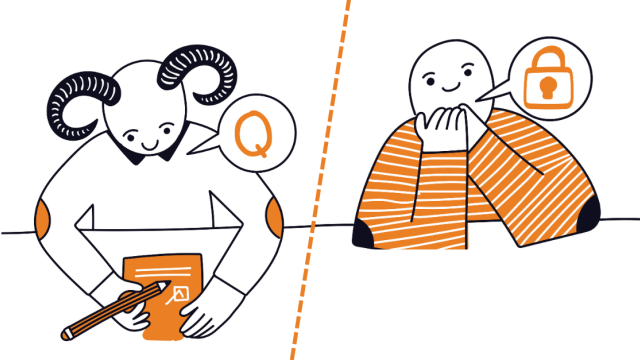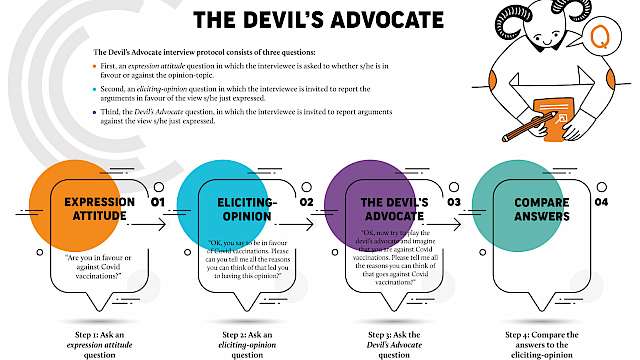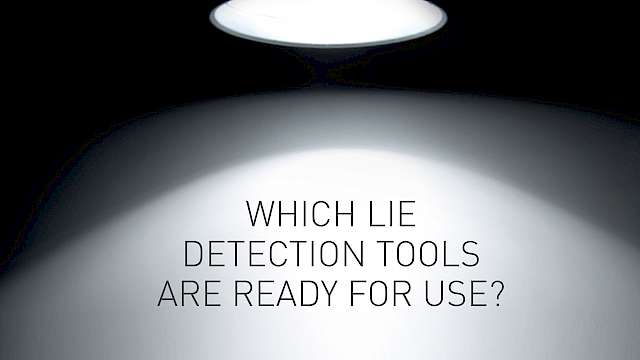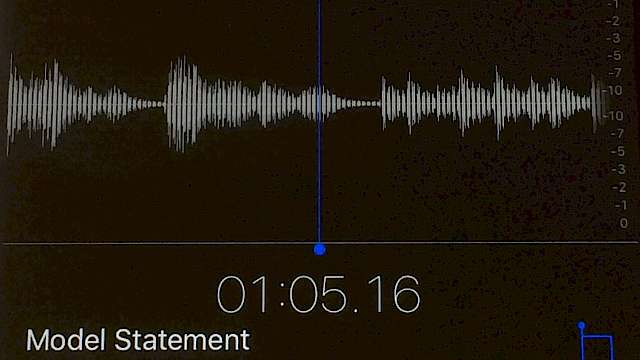Aldert Vrij
CREST outputs
Projects
Articles
Academic Publications
Collective Interviewing: The Use of a Model Statement to Differentiate between Pairs of Truth-Tellers and Pairs of Liars
Purpose
The current experiment examined the use of a model statement for aiding lie detection and gathering additional information during interviews in which pairs of suspects were interviewed together (i.e., collective interviewing). A model statement is an example of an answer, unrelated to the topic under investigation, which is played to suspects to demonstrate how much information the interviewer wants them to provide in response to the question asked.
Method
Pairs of truth‐tellers visited a restaurant together, whereas pairs of liars completed a mock crime. The task for all pairs was to convince an interviewer that they were visiting a restaurant together at the time the crime was committed. Half the truth‐telling pairs and half the lying pairs were exposed to a model statement, whilst the other halves were not.
Results
Truth‐telling pairs were more detailed and showed more interactions than lying pairs, particularly in the model statement present condition.
Conclusions
Being exposed to a model statement in a collective interview magnified the differences between pairs of truth‐tellers and pairs of liars in reporting detail and interacting with one another. A model statement is simple to implement and can be applied to many real‐world investigative interviewing settings whereby the focus is on lie detection and gathering as much information as possible.
(From the journal abstract)
Vernham, Zarah, Aldert Vrij, and Sharon Leal. 2018. ‘Collective Interviewing: The Use of a Model Statement to Differentiate between Pairs of Truth-Tellers and Pairs of Liars’. Legal and Criminological Psychology, July. https://doi.org/10.1111/lcrp.12136.
Deception and truth detection when analyzing nonverbal and verbal cues
In this article, I present my view on the significant developments and theoretical/empirical tipping points in nonverbal and verbal deception and lie detection from the last 30 years and on prospects for future research in this domain.
I discuss three major shifts in deception detection research: (a) From observing target persons' nonverbal behavior to analyzing their speech; (b) from lie detection based on differences between truth tellers and liars' levels of arousal to lie detection based on the different cognitive processes or strategies adopted to appear convincing; and (c) from passively observing target persons to actively interviewing them to elicit or enhance verbal cues to deceit.
Finally, I discuss my ideas for future research, focusing on initiatives from my own lab.
Hopefully, this will stimulate other researchers to explore innovative ideas in the verbal deception research domain, which already has seen so much progress in the last decade.
(From the journal abstract)
Vrij, Aldert. 2018. Deception and truth detection when analyzing nonverbal and verbal cues. Applied Cognitive Psychology. 10.1002/acp.3457.
Using the model statement to elicit verbal differences between truth tellers and liars amongst Arab interviewees: A partial replication of Leal, Vrij, Deeb, and Jupe (2018)
Leal, Vrij, Deeb, and Jupe (2018) found—with British participants—that a model statement elicited (a) more information and (b) a cue to deceit: After exposure to a model statement, liars reported significantly more peripheral information than truth tellers.
We sought to replicate these findings with Arabs living in Israel. Truth tellers and liars reported a stand‐out event that they had (truth tellers) or pretended to have (liars) experienced in the last 2 years. Half of the participants were given a model statement in the second phase of the interview. Replicating Leal et al. (2018a), (a) truth tellers reported more core details than liars initially and (b) a model statement resulted in more additional core and peripheral details in the second phase of the interview. Unlike in Leal et al. (2018a), a model statement did not have a differential effect on truth tellers in the current experiment.
(From the journal abstract)
Sharon Leal, Aldert Vrij, Zarah Vernham et al, 2019. Using the model statement to elicit verbal differences between truth tellers and liars amongst Arab interviewees: A partial replication of Leal, Vrij, Deeb, and Jupe (2018). Applied Cognitive Psychology. https://doi.org/10.1002/acp.3536
Sketching while narrating as a tool to detect deceit
In none of the deception studies that used drawings to date, was the effect of sketching on both speech content and drawing content examined, making it unclear what the full potential is of the use of drawings as a lie detection tool. A total of 122 truth tellers and liars took part in the study who did or did not sketch while narrating their allegedly experienced event. We formulated hypotheses about the total amount of information and number of complications reported and about various features of the drawings. Participants in the Sketch‐present condition provided more information than participants in the Sketch‐absent condition, and truth tellers reported more details than liars, but only in the Sketch‐present condition. In contrast to previous research, no Veracity differences occurred regarding the content of the drawings, perhaps because sketching was introduced as a tool that facilitated verbal recall and not as a stand‐alone tool.
(From the journal abstract)
Aldert Vrij, Samantha Mann, Sharon Leal, Ronald P. Fisher & Haneen Deeb, 2020. Sketching while narrating as a tool to detect deceit. Applied Cognitive Psychology. https://doi.org/10.1002/acp.3646
Facilitating recall and particularisation of repeated events in adults using a multi-method interviewing format
Reports about repeated experiences tend to include more schematic information than information about specific instances. However, investigators in both forensic and intelligence settings typically seek specific over general information. We tested a multi-method interviewing format (MMIF) to facilitate recall and particularisation of repeated events through the use of the self-generated cues mnemonic, the timeline technique, and follow-up questions. Over separate sessions, 150 adult participants watched four scripted films depicting a series of meetings in which a terrorist group planned attacks and planted explosive devices. For half of our sample, the third witnessed event included two deviations (one new detail and one changed detail). A week later, participants provided their account using the MMIF, the timeline technique with self-generated cues, or a free recall format followed by open-ended questions. As expected, more information was reported overall in the MMIF condition compared to the other format conditions, for two types of details, correct details, and correct gist details. The reporting of internal intrusions was comparable across format conditions. Contrary to hypotheses, the presence of deviations did not benefit recall or source monitoring. Our findings have implications for information elicitation in applied settings and for future research on adults’ retrieval of repeated events.
(From the journal abstract)
Kontogianni, F., Rubinova, E., Hope, L., Taylor, P. J., Vrij, A., & Gabbert, F. (2021). Facilitating recall and particularisation of repeated events in adults using a multi-method interviewing format. Memory, 29(4), 471–485.
https://doi.org/10.1080/09658211.2021.1903508Verbal cues to deceit when lying through omitting information
Background
Lying through omitting information has been neglected in verbal lie detection research. The task is challenging: Can we decipher from the truthful information a lie teller provides that s/he is hiding something? We expected this to be the case because of lie tellers’ inclination to keep their stories simple. We predicted lie tellers to provide fewer details and fewer complications than truth tellers, the latter particularly after exposure to a Model Statement.
Method
A total of 44 truth tellers and 41 lie tellers were interviewed about a conversation (debriefing interview) they had taken part in earlier. Lie tellers were asked not to discuss one aspect of that debriefing interview.
Results
Results showed that truth tellers reported more complications than lie tellers after exposure to a Model Statement.
Conclusion
Ideas about future research in lying through omissions are discussed.
(From the journal abstract)
Leal, S., Vrij, A., Deeb, H., Hudson, C., Capuozzo, P., & Fisher, R. P. (2020). Verbal cues to deceit when lying through omitting information. Legal and Criminological Psychology, 25(2), 278–294.
https://doi.org/10.1111/lcrp.12180Encouraging interviewees to say more and deception: The ghostwriter method
Background
We examined a new method to encourage interviewees to say more, the ghostwriter method, and examined its effect on eliciting information and cues to deceit.
Method
A total of 150 truth tellers and liars either told the truth about a trip they made in the last 12 months or pretended to have made such a trip. They were allocated to a Control condition, a ‘Be detailed’ condition in which they were encouraged to report even small details and a ghostwriter condition in which they were told to imagine talking to a ghostwriter. The dependent variables were details, complications, common knowledge details, self-handicapping strategies, proportion of complications, plausibility, and verifiable sources.
Results
The ghostwriter condition elicited more details and revealed in plausibility a stronger cue to deceit than the other two conditions.
Conclusion
The ghostwriter method appears to be a promising tool for eliciting information and cues to deceit.
(From the journal abstract)
Leal, S., Vrij, A., Deeb, H., & Kamermans, K. (2019). Encouraging interviewees to say more and deception: The ghostwriter method. Legal and Criminological Psychology, 24(2), 273–287
https://doi.org/10.1111/lcrp.12152Tracking the truth: The effect of face familiarity on eye fixations during deception
In forensic investigations, suspects sometimes conceal recognition of a familiar person to protect co-conspirators or hide knowledge of a victim. The current experiment sought to determine whether eye fixations could be used to identify memory of known persons when lying about recognition of faces. Participants’ eye movements were monitored whilst they lied and told the truth about recognition of faces that varied in familiarity (newly learned, famous celebrities, personally known). Memory detection by eye movements during recognition of personally familiar and famous celebrity faces was negligibly affected by lying, thereby demonstrating that detection of memory during lies is influenced by the prior learning of the face. By contrast, eye movements did not reveal lies robustly for newly learned faces. These findings support the use of eye movements as markers of memory during concealed recognition but also suggest caution when familiarity is only a consequence of one brief exposure.
(From the journal abstract)
Millen, A. E., Hope, L., Hillstrom, A. P., & Vrij, A. (2017). Tracking the truth: The effect of face familiarity on eye fixations during deception. Quarterly Journal of Experimental Psychology (2006), 70(5), 930–943.
https://doi.org/10.1080/17470218.2016.1172093A re-analysis that supports our main results: A reply to Levine et al
Levine et al. (2018) criticized our meta-analysis, but their conclusion was the same as ours: The cognitive approach to lie detection results in a modest improvement. We address and dismiss Levine et al.'s (2018) three criticisms. Regarding the ‘confound’, in our meta-analysis we averaged the results of two cells on statistical grounds, which does not constitute a confound in statistical terms. Regarding ‘aberrant controls’, that depends entirely on the benchmarks selected and type of statistical test and meta-analysis used. Regarding ‘unreliable data’, the claim that there is a positive relationship between ‘unreliable’ data and total accuracy in the cognitive lie detection conditions is not even supported by their own data (p = .16). We conclude with a request to Levine et al. to focus on our shared aim: to develop interview protocols that enable lie detection.
(From the journal abstract)
Vrij, A., Blank, H., & Fisher, R. P. (2018). A re-analysis that supports our main results: A reply to Levine et al . Legal and Criminological Psychology, 23(1), 20–23.
https://doi.org/10.1111/lcrp.12121Plausibility: A Verbal Cue to Veracity worth Examining?
Truth tellers sound more plausible than lie tellers. Plausibility ratings do not require much time or cognitive resources, but a disadvantage is that it is measured subjectively on Likert scales. The aim of the current paper was to understand if plausibility can be predicted by three other verbal veracity cues that can be measured objectively by counting their frequency of occurrence: details, complications, and verifiable sources. If these objective cues could predict plausibility, observers could be instructed to pay attention to them when judging plausibility, which would make plausibility ratings somewhat more objective. We therefore re-analysed five existing datasets; all of them included plausibility, details and complications and two of them also verifiable sources as dependent variables. Plausibility was positively correlated with all three other tested cues, but mostly predicted by complications and verifiable sources, explaining on average almost 40% of the variance. Plausibility showed larger effect sizes in distinguishing truth tellers from lie tellers than the three other cues, perhaps because the plausibility cue consists of multiple components (complications and verifiable sources). Research has shown that the cues that showed the strongest relationship with veracity typically consisted of multiple components.
(From the journal abstract)
Vrij, A., Deeb, H., Leal, S., Granhag, P.-A., & Fisher, R. P. (2021). Plausibility: A Verbal Cue to Veracity worth Examining? The European Journal of Psychology Applied to Legal Context, 13(2), 47–53.
https://doi.org/10.5093/ejpalc2021a4Which lie detection tools are ready for use in the criminal justice system?
We introduce ‘arousal based’ lie detection tools (the Behavior Analysis Interview, the Comparison Question polygraph Test, CQT) and ‘cognition based’ lie detection tools (imposing cognitive load, encouraging interviewees to say more, asking unexpected questions, Strategic Use of Evidence, Verifiability Approach and Concealed Information polygraph Test, CIT), and discuss whether they are ready for use in investigative interviews. We developed ten criteria on which to judge their suitability. The two arousal-based techniques (frequently used) fall short on numerous criteria. There are too many problems associated with the imposing cognitive load technique, but the other cognitive techniques are ready for use (encouraging interviewees to say more and Strategic Use of Evidence) or ready for use if they continue to receive support in empirical research (asking unexpected questions and Verifiability Approach). The CIT polygraph test cannot be included in a standard investigative interview but can be useful in addition to investigative interviewing.
(From the journal abstract)
Vrij, A., & Fisher, R. P. (2016). Which lie detection tools are ready for use in the criminal justice system? Journal of Applied Research in Memory and Cognition, 5(3), 302–307.
https://doi.org/10.1016/j.jarmac.2016.06.014Unraveling the Misconception About Deception and Nervous Behavior
In this article, we attempt to unravel the misconception about deception and nervous behavior. First we will cite research demonstrating that observers believe lie tellers display more nervous behaviors than truth tellers; that observers pay attention to nervous behaviors when they attempt to detect deception; and that lie tellers actually feel more nervous than truth tellers. This is all in alignment with a lie detection approach based on spotting nervous behaviors. We then will argue that the next, vital, step is missing: Research has found that lie tellers generally do not display more than truth tellers the nervous behaviors laypersons and professionals appear to focus on. If observers pay attention to nervous behaviors but lie tellers do not come across as being nervous, lie detection performance is expected to be poor. Research has supported this claim. We finally discuss ideas for research into lie detection based on non-verbal behaviors.
(From the journal abstract)
Vrij, A., & Fisher, R. P. (2020). Unraveling the Misconception About Deception and Nervous Behavior. Frontiers in Psychology, 11, 1377.
https://doi.org/10.3389/fpsyg.2020.01377‘Please tell me all you remember’: A comparison between British and Arab interviewees’ free narrative performance and its implications for lie detection
We examined how much information British and Arab truth tellers and lie tellers volunteer in an initial free narrative. Based on cultural differences in communication styles we predicted that British interviewees would report more details and more complications than Arab interviewees (culture main effect). We further predicted that truth tellers would report more details and complications than lie tellers (veracity main effect), particularly in the British sample (Veracity × Culture interaction effect). A total of 78 British and 76 Israeli-Arab participants took part. The experiment was carried out at a British university and an Israeli university. Participants carried out a mission. Truth tellers were instructed to report the mission truthfully in a subsequent interview whereas lie tellers were asked to lie about certain aspects of the mission. The three hypotheses were supported for details, whereas for complications only the predicted veracity main effect occurred.
(From the journal abstract)
Vrij, A., Leal, S., Mann, S., Vernham, Z., Dalton, G., Serok-Jeppa, O., Rozmann, N., Nahari, G., & Fisher, R. P. (2020). ‘Please tell me all you remember’: A comparison between British and Arab interviewees’ free narrative performance and its implications for lie detection. Psychiatry, Psychology and Law, 1–14.
https://doi.org/10.1080/13218719.2020.1805812Combining Verbal Veracity Assessment Techniques to Distinguish Truth Tellers from Lie Tellers
Cognitive Credibility Assessment (CCA) is a verbal lie detection tool consisting of several interview techniques. These techniques have been examined separately but never together. Reflecting the dynamic nature of CCA we combined several of the techniques (free recall followed by a model statement, followed by a reverse order instruction, and followed by a sketch instruction). We examined the new information provided after each stage of the interview and also compared the information provided in the initial recall with the information provided after the entire interview. A total of 47 truth tellers and 47 lie tellers went on a mission. Truth tellers were asked to report their mission truthfully, whereas lie tellers were requested to lie about several aspects of the mission. We measured the total units of information (total details) provided in the interview and the number of complications reported. The results indicate that the pre-registered hypothesis (Hypothesis 1) was supported for complications. Truth tellers reported more complications than lie tellers in each stage of the interview and the difference was more pronounced after the entire interview than after the free recall. As a conclusion, CCA was an effective lie detection method when complications were taken into account.
(From the journal abstract)
Vrij, A., Mann, S., Leal, S., & Fisher, R. P. (2020). Combining Verbal Veracity Assessment Techniques to Distinguish Truth Tellers from Lie Tellers. The European Journal of Psychology Applied to Legal Context, 13(1), 9–19.
https://doi.org/10.5093/ejpalc2021a2Reading Lies: Nonverbal Communication and Deception
The relationship between nonverbal communication and deception continues to attract much interest, but there are many misconceptions about it. In this review, we present a scientific view on this relationship. We describe theories explaining why liars would behave differently from truth tellers, followed by research on how liars actually behave and individuals’ ability to detect lies. We show that the nonverbal cues to deceit discovered to date are faint and unreliable and that people are mediocre lie catchers when they pay attention to behavior. We also discuss why individuals hold misbeliefs about the relationship between nonverbal behavior and deception—beliefs that appear very hard to debunk. We further discuss the ways in which researchers could improve the state of affairs by examining nonverbal behaviors in different ways and in different settings than they currently do.
(From the journal abstract)
Vrij, A., Hartwig, M., & Granhag, P. A. (2018). Reading lies: Nonverbal communication and deception. Annual Review of Psychology, 70, 297-315. Doi: annurev-psych-010418-103135
10.1146/annurev-psych-010418-103135A cognitive approach to lie detection: A metaanalysis
Introduction. This article provides a meta-analysis of a new, cognitive approach to (non-)verbal lie detection. This cognitive lie detection approach consists of three techniques: (1) imposing cognitive load, (2) encouraging interviewees to say more, and (3) asking unexpected questions.
Method. A meta-analysis was carried out on studies using the cognitive approach, 14 of which directly compared the cognitive approach to a standard approach.
Results. The cognitive lie detection approach produced superior accuracy results in truth detection (67%), lie detection (67%), and total detection (truth and lie detection combined, 71%) compared to a traditional standard approach (truth detection: 57%; lie detection: 47%; total detection: 56%).
Conclusions. Practitioners may find it useful to use a cognitive lie detection approach in their daily practice.
Vrij, A., Fisher, R., Blank, H. (2017). A cognitive approach to lie detection: A meta-analysis. Legal and Criminological Psychology, 22, 1-21.
https://doi.org/10.1111/lcrp.12088Psychological Perspectives on Interrogation
Proponents of “enhanced interrogation techniques” in the United States have claimed that such methods are necessary for obtaining information from uncooperative terrorism subjects. In the present article, we offer an informed, academic perspective on such claims. Psychological theory and research shows that harsh interrogation methods are ineffective. First, they are likely to increase resistance by the subject rather than facilitate cooperation. Second, the threatening and adversarial nature of harsh interrogation is often inimical to the goal of facilitating the retrieval of information from memory and therefore reduces the likelihood that a subject will provide reports that are extensive, detailed, and accurate. Third, harsh interrogation methods make lie detection difficult. Analyzing speech content and eliciting verifiable details are the most reliable cues to assessing credibility; however, to elicit such cues subjects must be encouraged to provide extensive narratives, something that does not occur in harsh interrogations. Evidence is accumulating for the effectiveness of rapport-based information-gathering approaches as an alternative to harsh interrogations. Such approaches promote cooperation, enhance recall of relevant and reliable information, and facilitate assessments of credibility. Given the available evidence that torture is ineffective, why might some laypersons, policymakers, and interrogation personnel support the use of torture? We conclude our review by offering a psychological perspective on this important question.
Vrij, A., Meissner, C. A, Fisher, R. P., Kassin, S. M., Morgan III, A., & Kleinman, S. (2017). Psychological perspectives on interrogation. Perspectives on Psychological Science, 12, 927-955.
https://doi.org/10.1177%2F1745691617706515Extending the verifiability approach framework: The effect of initial questioning
The verifiability approach (VA) is a lie-detection tool that examines reported checkable details. Across two studies, we attempt to exploit liar's preferred strategy of repeating information by examining the effect of questioning adult interviewees before the VA. In Study 1, truth tellers (n = 34) and liars (n = 33) were randomly assigned to either an initial open or closed questioning condition. After initial questioning, participants were interviewed using the VA. In Study 2, truth tellers (n = 48) and liars (n = 48) were interviewed twice, with half of each veracity group randomly assigned to either the Information Protocol (an instruction describing the importance of reporting verifiable details) or control condition. Only truth tellers revised their initial statement to include verifiable detail. This pattern was most pronounced when initial questioning was open (Study 1) and when the information protocol was employed (Study 2). Thus, liar's preferred strategy of maintaining consistency between statements appears exploitable using the VA.
Harvey, A., Vrij, A., Leal, S., Sariktas, G., & Nahari, G. (2017). Extending the Verifiability Approach framework: Examining the effect of preliminary questioning on the VA procedure. Submitted to Applied Cognitive Psychology, 32, 787-804.
https://doi.org/10.1002/acp.3465Unraveling the Misconception About Deception and Nervous Behavior
In this article, we attempt to unravel the misconception about deception and nervous behavior. First we will cite research demonstrating that observers believe lie tellers display more nervous behaviors than truth tellers; that observers pay attention to nervous behaviors when they attempt to detect deception; and that lie tellers actually feel more nervous than truth tellers. This is all in alignment with a lie detection approach based on spotting nervous behaviors. We then will argue that the next, vital, step is missing: Research has found that lie tellers generally do not display more than truth tellers the nervous behaviors laypersons and professionals appear to focus on. If observers pay attention to nervous behaviors but lie tellers do not come across as being nervous, lie detection performance is expected to be poor. Research has supported this claim. We finally discuss ideas for research into lie detection based on non-verbal behaviors.
Vrij, A., & Fisher, R. P. (2020). Unravelling the misconception about deception and nervous behaviour. Frontiers in Psychology, section Personality and Social Psychology, 11, 1377
https://doi.org/10.3389/fpsyg.2020.01377The Relationship between Complications, Common Knowledge Details and Self-handicapping Strategies and Veracity: A Meta-analysis
Practitioners frequently inform us that variable ‘total details’ is not suitable for lie detection purposes in real life interviews. Practitioners cannot count the number of details in real time and the threshold of details required to classify someone as a truth teller or a lie teller is unknown. The authors started to address these issues by examining three new verbal veracity cues: complications, common knowledge details, and self-handicapping strategies. We present a meta-analysis regarding these three variables and compared the results with ‘total details’. Truth tellers reported more details (d = 0.28 to d = 0.45) and more complications (d = 0.51 to d = 0.62) and fewer common knowledge details (d = -0.40 to d = -0.46) and self-handicapping strategies (d = -0.37 to d = -0.50) than lie tellers. Complications was the best diagnostic veracity cue. The findings were similar for the initial free recall and the second recall in which only new information was examined. Four moderators (scenario, motivation, modality, and interview technique) did not affect the results. As a conclusion, complications in particular appear to be a good veracity indicator but more research is required. We included suggestions for such research.
Vrij, A., Palena, N., Leal, S., & Caso, L. (2021). The relationship between complications, common knowledge details and self-handicapping strategies and veracity: A meta-analysis. European Journal of Psychology Applied to Legal Context, 13 (2), 55-77
https://doi.org/10.5093/ejpalc2021a7‘Language of lies’: Urgent issues and prospects in verbal lie detection research
Since its introduction into the field of deception detection, the verbal channel has become a rapidly growing area of research. The basic assumption is that liars differ from truth tellers in their verbal behaviour, making it possible to classify them by inspecting their verbal accounts. However, as noted in conferences and in private communication between researchers, the field of verbal lie detection faces several challenges that merit focused attention. The first author therefore proposed a workshop with the mission of promoting solutions for urgent issues in the field. Nine researchers and three practitioners with experience in credibility assessments gathered for 3 days of discussion at Bar-Ilan University (Israel) in the first international verbal lie detection workshop. The primary session of the workshop took place the morning of the first day. In this session, each of the participants had up to 10 min to deliver a brief message, using just one slide. Researchers were asked to answer the question: ‘In your view, what is the most urgent, unsolved question/issue in verbal lie detection?’ Similarly, practitioners were asked: ‘As a practitioner, what question/issue do you wish verbal lie detection research would address?’ The issues raised served as the basis for the discussions that were held throughout the workshop. The current paper first presents the urgent, unsolved issues raised by the workshop group members in the main session, followed by a message to researchers in the field, designed to deliver the insights, decisions, and conclusions resulting from the discussions.
Nahari, G., Ashkenazi, T., Fisher, R. P., Granhag, P. A., Hershkovitz, I., Masip, J., Meijer, E., Nisin, Z., Sarid, N., Taylor, P. J., Verschuere, B., & Vrij, A. (2019). Language of Lies: Urgent issues and prospects in verbal lie detection research. Legal and Criminological Psychology, 24, 1-23.
https://doi.org/10.1111/lcrp.12148Actions speak louder than words: The Devil's Advocate questioning protocol in opinions about protester actions
The Devil's Advocate protocol has been developed to assist making veracity assessments when someone discusses their opinion. The present experiment focused on protester actions rather than controversial issues and also included an adapted version of the Verifiability Approach. Participants told the truth or lied about protester actions and the participants' answers to the eliciting opinion and Devil's Advocate questions were compared. The Devil's Advocate approach predicts the difference in answers (residue scores) to be more pronounced in truth tellers than in lie tellers in terms of quantity of the answers (number of words, details and arguments) and quality of the answers (plausibility, immediacy and clarity). The hypothesis was supported but only in terms of quality: Truth tellers' answers sounded more plausible and immediate and somewhat clearer than lie tellers' answers. Truth tellers also reported more digital verifiable sources than lie tellers.
(From the journal abstract)
Mann, S., Vrij, A., Deeb, H., Leal, S. (2022) Actions speak louder than words: The Devil's Advocate questioning protocol in opinions about protester actions, Applied Cognitive Psychology, https://doi.org/10.1002/acp.3979
https://doi.org/10.1002/acp.3979How researchers can make verbal lie detection more attractive for practitioners
Over the last 30 years deception researchers have changed their attention from observing nonverbal behaviour to analysing speech content. However, many practitioners we speak to are reluctant to make the change from nonverbal to verbal lie detection. In this article we present what practitioners believe is problematic about verbal lie detection: the interview style typically used is not suited for verbal lie detection; the most diagnostic verbal cue to deceit (total details) is not suited for lie detection purposes; practitioners are looking for signs of deception but verbal deception researchers are mainly examining cues that indicate truthfulness; cut-off points (decision rules to decide when someone is lying) do not exist; different verbal indicators are required for different types of lie; and verbal veracity indicators may be culturally defined. We discuss how researchers could address these problems.
(From the journal abstract)
Vrij, A., Fisher, R. P. & Leal, S. (2023) How researchers can make verbal lie detection more attractive for practitioners, Psychiatry, Psychology and Law, 30:3, 383-396, DOI: 10.1080/13218719.2022.2035842
https://doi.org/10.1080/13218719.2022.2035842Lying through omitting information: examining the effect of a Model Statement interview protocol on verbal cues to deceit
Background/objectives: Practitioners frequently inform us that lying through omitting information is relevant to them, yet this topic has been largely ignored by verbal lie detection researchers. Method: In the present experiment participants watched a video recording of a secret meeting between three people. Truth tellers were instructed to recall the meeting truthfully, and lie tellers were instructed to pretend that one person (John) was not there. Participants were or were not exposed to a Model Statement during the interview. The dependent variables were ‘total details’ and ‘complications’. Results: Truth tellers reported more complications than lie tellers but lie tellers reported more details than truth tellers. The Model Statement resulted in more complications and details being reported. The Veracity x Model Statement interaction effect was not significant. In terms of self-reported strategies, the main veracity difference was that truth tellers were more inclined to ‘be detailed” than lie tellers. Discussion: We discuss the atypical finding (most details reported by lie tellers) and ideas for future research.
(From the journal abstract)
Leal, S., Vrij, A., Deeb, H., Burkhardt, J., Dabrowna, O. & Fisher, R. P. (2023). Verbal Cues to Deceit when Lying through Omitting Information: Examining the Effect of a Model Statement Interview Protocol. The European Journal of Psychology Applied to Legal Context, 15(1), 1 - 8. https://doi.org/10.5093/ejpalc2023a1
https://doi.org/10.5093/ejpalc2023a1
Projects
Articles
Academic Publications
Collective Interviewing: The Use of a Model Statement to Differentiate between Pairs of Truth-Tellers and Pairs of Liars
Purpose
The current experiment examined the use of a model statement for aiding lie detection and gathering additional information during interviews in which pairs of suspects were interviewed together (i.e., collective interviewing). A model statement is an example of an answer, unrelated to the topic under investigation, which is played to suspects to demonstrate how much information the interviewer wants them to provide in response to the question asked.
Method
Pairs of truth‐tellers visited a restaurant together, whereas pairs of liars completed a mock crime. The task for all pairs was to convince an interviewer that they were visiting a restaurant together at the time the crime was committed. Half the truth‐telling pairs and half the lying pairs were exposed to a model statement, whilst the other halves were not.
Results
Truth‐telling pairs were more detailed and showed more interactions than lying pairs, particularly in the model statement present condition.
Conclusions
Being exposed to a model statement in a collective interview magnified the differences between pairs of truth‐tellers and pairs of liars in reporting detail and interacting with one another. A model statement is simple to implement and can be applied to many real‐world investigative interviewing settings whereby the focus is on lie detection and gathering as much information as possible.
(From the journal abstract)
Vernham, Zarah, Aldert Vrij, and Sharon Leal. 2018. ‘Collective Interviewing: The Use of a Model Statement to Differentiate between Pairs of Truth-Tellers and Pairs of Liars’. Legal and Criminological Psychology, July. https://doi.org/10.1111/lcrp.12136.
Deception and truth detection when analyzing nonverbal and verbal cues
In this article, I present my view on the significant developments and theoretical/empirical tipping points in nonverbal and verbal deception and lie detection from the last 30 years and on prospects for future research in this domain.
I discuss three major shifts in deception detection research: (a) From observing target persons' nonverbal behavior to analyzing their speech; (b) from lie detection based on differences between truth tellers and liars' levels of arousal to lie detection based on the different cognitive processes or strategies adopted to appear convincing; and (c) from passively observing target persons to actively interviewing them to elicit or enhance verbal cues to deceit.
Finally, I discuss my ideas for future research, focusing on initiatives from my own lab.
Hopefully, this will stimulate other researchers to explore innovative ideas in the verbal deception research domain, which already has seen so much progress in the last decade.
(From the journal abstract)
Vrij, Aldert. 2018. Deception and truth detection when analyzing nonverbal and verbal cues. Applied Cognitive Psychology. 10.1002/acp.3457.
Using the model statement to elicit verbal differences between truth tellers and liars amongst Arab interviewees: A partial replication of Leal, Vrij, Deeb, and Jupe (2018)
Leal, Vrij, Deeb, and Jupe (2018) found—with British participants—that a model statement elicited (a) more information and (b) a cue to deceit: After exposure to a model statement, liars reported significantly more peripheral information than truth tellers.
We sought to replicate these findings with Arabs living in Israel. Truth tellers and liars reported a stand‐out event that they had (truth tellers) or pretended to have (liars) experienced in the last 2 years. Half of the participants were given a model statement in the second phase of the interview. Replicating Leal et al. (2018a), (a) truth tellers reported more core details than liars initially and (b) a model statement resulted in more additional core and peripheral details in the second phase of the interview. Unlike in Leal et al. (2018a), a model statement did not have a differential effect on truth tellers in the current experiment.
(From the journal abstract)
Sharon Leal, Aldert Vrij, Zarah Vernham et al, 2019. Using the model statement to elicit verbal differences between truth tellers and liars amongst Arab interviewees: A partial replication of Leal, Vrij, Deeb, and Jupe (2018). Applied Cognitive Psychology. https://doi.org/10.1002/acp.3536
Sketching while narrating as a tool to detect deceit
In none of the deception studies that used drawings to date, was the effect of sketching on both speech content and drawing content examined, making it unclear what the full potential is of the use of drawings as a lie detection tool. A total of 122 truth tellers and liars took part in the study who did or did not sketch while narrating their allegedly experienced event. We formulated hypotheses about the total amount of information and number of complications reported and about various features of the drawings. Participants in the Sketch‐present condition provided more information than participants in the Sketch‐absent condition, and truth tellers reported more details than liars, but only in the Sketch‐present condition. In contrast to previous research, no Veracity differences occurred regarding the content of the drawings, perhaps because sketching was introduced as a tool that facilitated verbal recall and not as a stand‐alone tool.
(From the journal abstract)
Aldert Vrij, Samantha Mann, Sharon Leal, Ronald P. Fisher & Haneen Deeb, 2020. Sketching while narrating as a tool to detect deceit. Applied Cognitive Psychology. https://doi.org/10.1002/acp.3646
Facilitating recall and particularisation of repeated events in adults using a multi-method interviewing format
Reports about repeated experiences tend to include more schematic information than information about specific instances. However, investigators in both forensic and intelligence settings typically seek specific over general information. We tested a multi-method interviewing format (MMIF) to facilitate recall and particularisation of repeated events through the use of the self-generated cues mnemonic, the timeline technique, and follow-up questions. Over separate sessions, 150 adult participants watched four scripted films depicting a series of meetings in which a terrorist group planned attacks and planted explosive devices. For half of our sample, the third witnessed event included two deviations (one new detail and one changed detail). A week later, participants provided their account using the MMIF, the timeline technique with self-generated cues, or a free recall format followed by open-ended questions. As expected, more information was reported overall in the MMIF condition compared to the other format conditions, for two types of details, correct details, and correct gist details. The reporting of internal intrusions was comparable across format conditions. Contrary to hypotheses, the presence of deviations did not benefit recall or source monitoring. Our findings have implications for information elicitation in applied settings and for future research on adults’ retrieval of repeated events.
(From the journal abstract)
Kontogianni, F., Rubinova, E., Hope, L., Taylor, P. J., Vrij, A., & Gabbert, F. (2021). Facilitating recall and particularisation of repeated events in adults using a multi-method interviewing format. Memory, 29(4), 471–485.
Verbal cues to deceit when lying through omitting information
Background
Lying through omitting information has been neglected in verbal lie detection research. The task is challenging: Can we decipher from the truthful information a lie teller provides that s/he is hiding something? We expected this to be the case because of lie tellers’ inclination to keep their stories simple. We predicted lie tellers to provide fewer details and fewer complications than truth tellers, the latter particularly after exposure to a Model Statement.
Method
A total of 44 truth tellers and 41 lie tellers were interviewed about a conversation (debriefing interview) they had taken part in earlier. Lie tellers were asked not to discuss one aspect of that debriefing interview.
Results
Results showed that truth tellers reported more complications than lie tellers after exposure to a Model Statement.
Conclusion
Ideas about future research in lying through omissions are discussed.
(From the journal abstract)
Leal, S., Vrij, A., Deeb, H., Hudson, C., Capuozzo, P., & Fisher, R. P. (2020). Verbal cues to deceit when lying through omitting information. Legal and Criminological Psychology, 25(2), 278–294.
Encouraging interviewees to say more and deception: The ghostwriter method
Background
We examined a new method to encourage interviewees to say more, the ghostwriter method, and examined its effect on eliciting information and cues to deceit.
Method
A total of 150 truth tellers and liars either told the truth about a trip they made in the last 12 months or pretended to have made such a trip. They were allocated to a Control condition, a ‘Be detailed’ condition in which they were encouraged to report even small details and a ghostwriter condition in which they were told to imagine talking to a ghostwriter. The dependent variables were details, complications, common knowledge details, self-handicapping strategies, proportion of complications, plausibility, and verifiable sources.
Results
The ghostwriter condition elicited more details and revealed in plausibility a stronger cue to deceit than the other two conditions.
Conclusion
The ghostwriter method appears to be a promising tool for eliciting information and cues to deceit.
(From the journal abstract)
Leal, S., Vrij, A., Deeb, H., & Kamermans, K. (2019). Encouraging interviewees to say more and deception: The ghostwriter method. Legal and Criminological Psychology, 24(2), 273–287
Tracking the truth: The effect of face familiarity on eye fixations during deception
In forensic investigations, suspects sometimes conceal recognition of a familiar person to protect co-conspirators or hide knowledge of a victim. The current experiment sought to determine whether eye fixations could be used to identify memory of known persons when lying about recognition of faces. Participants’ eye movements were monitored whilst they lied and told the truth about recognition of faces that varied in familiarity (newly learned, famous celebrities, personally known). Memory detection by eye movements during recognition of personally familiar and famous celebrity faces was negligibly affected by lying, thereby demonstrating that detection of memory during lies is influenced by the prior learning of the face. By contrast, eye movements did not reveal lies robustly for newly learned faces. These findings support the use of eye movements as markers of memory during concealed recognition but also suggest caution when familiarity is only a consequence of one brief exposure.
(From the journal abstract)
Millen, A. E., Hope, L., Hillstrom, A. P., & Vrij, A. (2017). Tracking the truth: The effect of face familiarity on eye fixations during deception. Quarterly Journal of Experimental Psychology (2006), 70(5), 930–943.
A re-analysis that supports our main results: A reply to Levine et al
Levine et al. (2018) criticized our meta-analysis, but their conclusion was the same as ours: The cognitive approach to lie detection results in a modest improvement. We address and dismiss Levine et al.'s (2018) three criticisms. Regarding the ‘confound’, in our meta-analysis we averaged the results of two cells on statistical grounds, which does not constitute a confound in statistical terms. Regarding ‘aberrant controls’, that depends entirely on the benchmarks selected and type of statistical test and meta-analysis used. Regarding ‘unreliable data’, the claim that there is a positive relationship between ‘unreliable’ data and total accuracy in the cognitive lie detection conditions is not even supported by their own data (p = .16). We conclude with a request to Levine et al. to focus on our shared aim: to develop interview protocols that enable lie detection.
(From the journal abstract)
Vrij, A., Blank, H., & Fisher, R. P. (2018). A re-analysis that supports our main results: A reply to Levine et al . Legal and Criminological Psychology, 23(1), 20–23.
Plausibility: A Verbal Cue to Veracity worth Examining?
Truth tellers sound more plausible than lie tellers. Plausibility ratings do not require much time or cognitive resources, but a disadvantage is that it is measured subjectively on Likert scales. The aim of the current paper was to understand if plausibility can be predicted by three other verbal veracity cues that can be measured objectively by counting their frequency of occurrence: details, complications, and verifiable sources. If these objective cues could predict plausibility, observers could be instructed to pay attention to them when judging plausibility, which would make plausibility ratings somewhat more objective. We therefore re-analysed five existing datasets; all of them included plausibility, details and complications and two of them also verifiable sources as dependent variables. Plausibility was positively correlated with all three other tested cues, but mostly predicted by complications and verifiable sources, explaining on average almost 40% of the variance. Plausibility showed larger effect sizes in distinguishing truth tellers from lie tellers than the three other cues, perhaps because the plausibility cue consists of multiple components (complications and verifiable sources). Research has shown that the cues that showed the strongest relationship with veracity typically consisted of multiple components.
(From the journal abstract)
Vrij, A., Deeb, H., Leal, S., Granhag, P.-A., & Fisher, R. P. (2021). Plausibility: A Verbal Cue to Veracity worth Examining? The European Journal of Psychology Applied to Legal Context, 13(2), 47–53.
Which lie detection tools are ready for use in the criminal justice system?
We introduce ‘arousal based’ lie detection tools (the Behavior Analysis Interview, the Comparison Question polygraph Test, CQT) and ‘cognition based’ lie detection tools (imposing cognitive load, encouraging interviewees to say more, asking unexpected questions, Strategic Use of Evidence, Verifiability Approach and Concealed Information polygraph Test, CIT), and discuss whether they are ready for use in investigative interviews. We developed ten criteria on which to judge their suitability. The two arousal-based techniques (frequently used) fall short on numerous criteria. There are too many problems associated with the imposing cognitive load technique, but the other cognitive techniques are ready for use (encouraging interviewees to say more and Strategic Use of Evidence) or ready for use if they continue to receive support in empirical research (asking unexpected questions and Verifiability Approach). The CIT polygraph test cannot be included in a standard investigative interview but can be useful in addition to investigative interviewing.
(From the journal abstract)
Vrij, A., & Fisher, R. P. (2016). Which lie detection tools are ready for use in the criminal justice system? Journal of Applied Research in Memory and Cognition, 5(3), 302–307.
Unraveling the Misconception About Deception and Nervous Behavior
In this article, we attempt to unravel the misconception about deception and nervous behavior. First we will cite research demonstrating that observers believe lie tellers display more nervous behaviors than truth tellers; that observers pay attention to nervous behaviors when they attempt to detect deception; and that lie tellers actually feel more nervous than truth tellers. This is all in alignment with a lie detection approach based on spotting nervous behaviors. We then will argue that the next, vital, step is missing: Research has found that lie tellers generally do not display more than truth tellers the nervous behaviors laypersons and professionals appear to focus on. If observers pay attention to nervous behaviors but lie tellers do not come across as being nervous, lie detection performance is expected to be poor. Research has supported this claim. We finally discuss ideas for research into lie detection based on non-verbal behaviors.
(From the journal abstract)
Vrij, A., & Fisher, R. P. (2020). Unraveling the Misconception About Deception and Nervous Behavior. Frontiers in Psychology, 11, 1377.
‘Please tell me all you remember’: A comparison between British and Arab interviewees’ free narrative performance and its implications for lie detection
We examined how much information British and Arab truth tellers and lie tellers volunteer in an initial free narrative. Based on cultural differences in communication styles we predicted that British interviewees would report more details and more complications than Arab interviewees (culture main effect). We further predicted that truth tellers would report more details and complications than lie tellers (veracity main effect), particularly in the British sample (Veracity × Culture interaction effect). A total of 78 British and 76 Israeli-Arab participants took part. The experiment was carried out at a British university and an Israeli university. Participants carried out a mission. Truth tellers were instructed to report the mission truthfully in a subsequent interview whereas lie tellers were asked to lie about certain aspects of the mission. The three hypotheses were supported for details, whereas for complications only the predicted veracity main effect occurred.
(From the journal abstract)
Vrij, A., Leal, S., Mann, S., Vernham, Z., Dalton, G., Serok-Jeppa, O., Rozmann, N., Nahari, G., & Fisher, R. P. (2020). ‘Please tell me all you remember’: A comparison between British and Arab interviewees’ free narrative performance and its implications for lie detection. Psychiatry, Psychology and Law, 1–14.
Combining Verbal Veracity Assessment Techniques to Distinguish Truth Tellers from Lie Tellers
Cognitive Credibility Assessment (CCA) is a verbal lie detection tool consisting of several interview techniques. These techniques have been examined separately but never together. Reflecting the dynamic nature of CCA we combined several of the techniques (free recall followed by a model statement, followed by a reverse order instruction, and followed by a sketch instruction). We examined the new information provided after each stage of the interview and also compared the information provided in the initial recall with the information provided after the entire interview. A total of 47 truth tellers and 47 lie tellers went on a mission. Truth tellers were asked to report their mission truthfully, whereas lie tellers were requested to lie about several aspects of the mission. We measured the total units of information (total details) provided in the interview and the number of complications reported. The results indicate that the pre-registered hypothesis (Hypothesis 1) was supported for complications. Truth tellers reported more complications than lie tellers in each stage of the interview and the difference was more pronounced after the entire interview than after the free recall. As a conclusion, CCA was an effective lie detection method when complications were taken into account.
(From the journal abstract)
Vrij, A., Mann, S., Leal, S., & Fisher, R. P. (2020). Combining Verbal Veracity Assessment Techniques to Distinguish Truth Tellers from Lie Tellers. The European Journal of Psychology Applied to Legal Context, 13(1), 9–19.
Reading Lies: Nonverbal Communication and Deception
The relationship between nonverbal communication and deception continues to attract much interest, but there are many misconceptions about it. In this review, we present a scientific view on this relationship. We describe theories explaining why liars would behave differently from truth tellers, followed by research on how liars actually behave and individuals’ ability to detect lies. We show that the nonverbal cues to deceit discovered to date are faint and unreliable and that people are mediocre lie catchers when they pay attention to behavior. We also discuss why individuals hold misbeliefs about the relationship between nonverbal behavior and deception—beliefs that appear very hard to debunk. We further discuss the ways in which researchers could improve the state of affairs by examining nonverbal behaviors in different ways and in different settings than they currently do.
(From the journal abstract)
Vrij, A., Hartwig, M., & Granhag, P. A. (2018). Reading lies: Nonverbal communication and deception. Annual Review of Psychology, 70, 297-315. Doi: annurev-psych-010418-103135
A cognitive approach to lie detection: A metaanalysis
Introduction. This article provides a meta-analysis of a new, cognitive approach to (non-)verbal lie detection. This cognitive lie detection approach consists of three techniques: (1) imposing cognitive load, (2) encouraging interviewees to say more, and (3) asking unexpected questions.
Method. A meta-analysis was carried out on studies using the cognitive approach, 14 of which directly compared the cognitive approach to a standard approach.
Results. The cognitive lie detection approach produced superior accuracy results in truth detection (67%), lie detection (67%), and total detection (truth and lie detection combined, 71%) compared to a traditional standard approach (truth detection: 57%; lie detection: 47%; total detection: 56%).
Conclusions. Practitioners may find it useful to use a cognitive lie detection approach in their daily practice.
Vrij, A., Fisher, R., Blank, H. (2017). A cognitive approach to lie detection: A meta-analysis. Legal and Criminological Psychology, 22, 1-21.
Psychological Perspectives on Interrogation
Proponents of “enhanced interrogation techniques” in the United States have claimed that such methods are necessary for obtaining information from uncooperative terrorism subjects. In the present article, we offer an informed, academic perspective on such claims. Psychological theory and research shows that harsh interrogation methods are ineffective. First, they are likely to increase resistance by the subject rather than facilitate cooperation. Second, the threatening and adversarial nature of harsh interrogation is often inimical to the goal of facilitating the retrieval of information from memory and therefore reduces the likelihood that a subject will provide reports that are extensive, detailed, and accurate. Third, harsh interrogation methods make lie detection difficult. Analyzing speech content and eliciting verifiable details are the most reliable cues to assessing credibility; however, to elicit such cues subjects must be encouraged to provide extensive narratives, something that does not occur in harsh interrogations. Evidence is accumulating for the effectiveness of rapport-based information-gathering approaches as an alternative to harsh interrogations. Such approaches promote cooperation, enhance recall of relevant and reliable information, and facilitate assessments of credibility. Given the available evidence that torture is ineffective, why might some laypersons, policymakers, and interrogation personnel support the use of torture? We conclude our review by offering a psychological perspective on this important question.
Vrij, A., Meissner, C. A, Fisher, R. P., Kassin, S. M., Morgan III, A., & Kleinman, S. (2017). Psychological perspectives on interrogation. Perspectives on Psychological Science, 12, 927-955.
Extending the verifiability approach framework: The effect of initial questioning
The verifiability approach (VA) is a lie-detection tool that examines reported checkable details. Across two studies, we attempt to exploit liar's preferred strategy of repeating information by examining the effect of questioning adult interviewees before the VA. In Study 1, truth tellers (n = 34) and liars (n = 33) were randomly assigned to either an initial open or closed questioning condition. After initial questioning, participants were interviewed using the VA. In Study 2, truth tellers (n = 48) and liars (n = 48) were interviewed twice, with half of each veracity group randomly assigned to either the Information Protocol (an instruction describing the importance of reporting verifiable details) or control condition. Only truth tellers revised their initial statement to include verifiable detail. This pattern was most pronounced when initial questioning was open (Study 1) and when the information protocol was employed (Study 2). Thus, liar's preferred strategy of maintaining consistency between statements appears exploitable using the VA.
Harvey, A., Vrij, A., Leal, S., Sariktas, G., & Nahari, G. (2017). Extending the Verifiability Approach framework: Examining the effect of preliminary questioning on the VA procedure. Submitted to Applied Cognitive Psychology, 32, 787-804.
Unraveling the Misconception About Deception and Nervous Behavior
In this article, we attempt to unravel the misconception about deception and nervous behavior. First we will cite research demonstrating that observers believe lie tellers display more nervous behaviors than truth tellers; that observers pay attention to nervous behaviors when they attempt to detect deception; and that lie tellers actually feel more nervous than truth tellers. This is all in alignment with a lie detection approach based on spotting nervous behaviors. We then will argue that the next, vital, step is missing: Research has found that lie tellers generally do not display more than truth tellers the nervous behaviors laypersons and professionals appear to focus on. If observers pay attention to nervous behaviors but lie tellers do not come across as being nervous, lie detection performance is expected to be poor. Research has supported this claim. We finally discuss ideas for research into lie detection based on non-verbal behaviors.
Vrij, A., & Fisher, R. P. (2020). Unravelling the misconception about deception and nervous behaviour. Frontiers in Psychology, section Personality and Social Psychology, 11, 1377
The Relationship between Complications, Common Knowledge Details and Self-handicapping Strategies and Veracity: A Meta-analysis
Practitioners frequently inform us that variable ‘total details’ is not suitable for lie detection purposes in real life interviews. Practitioners cannot count the number of details in real time and the threshold of details required to classify someone as a truth teller or a lie teller is unknown. The authors started to address these issues by examining three new verbal veracity cues: complications, common knowledge details, and self-handicapping strategies. We present a meta-analysis regarding these three variables and compared the results with ‘total details’. Truth tellers reported more details (d = 0.28 to d = 0.45) and more complications (d = 0.51 to d = 0.62) and fewer common knowledge details (d = -0.40 to d = -0.46) and self-handicapping strategies (d = -0.37 to d = -0.50) than lie tellers. Complications was the best diagnostic veracity cue. The findings were similar for the initial free recall and the second recall in which only new information was examined. Four moderators (scenario, motivation, modality, and interview technique) did not affect the results. As a conclusion, complications in particular appear to be a good veracity indicator but more research is required. We included suggestions for such research.
Vrij, A., Palena, N., Leal, S., & Caso, L. (2021). The relationship between complications, common knowledge details and self-handicapping strategies and veracity: A meta-analysis. European Journal of Psychology Applied to Legal Context, 13 (2), 55-77
‘Language of lies’: Urgent issues and prospects in verbal lie detection research
Since its introduction into the field of deception detection, the verbal channel has become a rapidly growing area of research. The basic assumption is that liars differ from truth tellers in their verbal behaviour, making it possible to classify them by inspecting their verbal accounts. However, as noted in conferences and in private communication between researchers, the field of verbal lie detection faces several challenges that merit focused attention. The first author therefore proposed a workshop with the mission of promoting solutions for urgent issues in the field. Nine researchers and three practitioners with experience in credibility assessments gathered for 3 days of discussion at Bar-Ilan University (Israel) in the first international verbal lie detection workshop. The primary session of the workshop took place the morning of the first day. In this session, each of the participants had up to 10 min to deliver a brief message, using just one slide. Researchers were asked to answer the question: ‘In your view, what is the most urgent, unsolved question/issue in verbal lie detection?’ Similarly, practitioners were asked: ‘As a practitioner, what question/issue do you wish verbal lie detection research would address?’ The issues raised served as the basis for the discussions that were held throughout the workshop. The current paper first presents the urgent, unsolved issues raised by the workshop group members in the main session, followed by a message to researchers in the field, designed to deliver the insights, decisions, and conclusions resulting from the discussions.
Nahari, G., Ashkenazi, T., Fisher, R. P., Granhag, P. A., Hershkovitz, I., Masip, J., Meijer, E., Nisin, Z., Sarid, N., Taylor, P. J., Verschuere, B., & Vrij, A. (2019). Language of Lies: Urgent issues and prospects in verbal lie detection research. Legal and Criminological Psychology, 24, 1-23.
Actions speak louder than words: The Devil's Advocate questioning protocol in opinions about protester actions
The Devil's Advocate protocol has been developed to assist making veracity assessments when someone discusses their opinion. The present experiment focused on protester actions rather than controversial issues and also included an adapted version of the Verifiability Approach. Participants told the truth or lied about protester actions and the participants' answers to the eliciting opinion and Devil's Advocate questions were compared. The Devil's Advocate approach predicts the difference in answers (residue scores) to be more pronounced in truth tellers than in lie tellers in terms of quantity of the answers (number of words, details and arguments) and quality of the answers (plausibility, immediacy and clarity). The hypothesis was supported but only in terms of quality: Truth tellers' answers sounded more plausible and immediate and somewhat clearer than lie tellers' answers. Truth tellers also reported more digital verifiable sources than lie tellers.
(From the journal abstract)
Mann, S., Vrij, A., Deeb, H., Leal, S. (2022) Actions speak louder than words: The Devil's Advocate questioning protocol in opinions about protester actions, Applied Cognitive Psychology, https://doi.org/10.1002/acp.3979
How researchers can make verbal lie detection more attractive for practitioners
Over the last 30 years deception researchers have changed their attention from observing nonverbal behaviour to analysing speech content. However, many practitioners we speak to are reluctant to make the change from nonverbal to verbal lie detection. In this article we present what practitioners believe is problematic about verbal lie detection: the interview style typically used is not suited for verbal lie detection; the most diagnostic verbal cue to deceit (total details) is not suited for lie detection purposes; practitioners are looking for signs of deception but verbal deception researchers are mainly examining cues that indicate truthfulness; cut-off points (decision rules to decide when someone is lying) do not exist; different verbal indicators are required for different types of lie; and verbal veracity indicators may be culturally defined. We discuss how researchers could address these problems.
(From the journal abstract)
Vrij, A., Fisher, R. P. & Leal, S. (2023) How researchers can make verbal lie detection more attractive for practitioners, Psychiatry, Psychology and Law, 30:3, 383-396, DOI: 10.1080/13218719.2022.2035842
Lying through omitting information: examining the effect of a Model Statement interview protocol on verbal cues to deceit
Background/objectives: Practitioners frequently inform us that lying through omitting information is relevant to them, yet this topic has been largely ignored by verbal lie detection researchers. Method: In the present experiment participants watched a video recording of a secret meeting between three people. Truth tellers were instructed to recall the meeting truthfully, and lie tellers were instructed to pretend that one person (John) was not there. Participants were or were not exposed to a Model Statement during the interview. The dependent variables were ‘total details’ and ‘complications’. Results: Truth tellers reported more complications than lie tellers but lie tellers reported more details than truth tellers. The Model Statement resulted in more complications and details being reported. The Veracity x Model Statement interaction effect was not significant. In terms of self-reported strategies, the main veracity difference was that truth tellers were more inclined to ‘be detailed” than lie tellers. Discussion: We discuss the atypical finding (most details reported by lie tellers) and ideas for future research.
(From the journal abstract)
Leal, S., Vrij, A., Deeb, H., Burkhardt, J., Dabrowna, O. & Fisher, R. P. (2023). Verbal Cues to Deceit when Lying through Omitting Information: Examining the Effect of a Model Statement Interview Protocol. The European Journal of Psychology Applied to Legal Context, 15(1), 1 - 8. https://doi.org/10.5093/ejpalc2023a1










